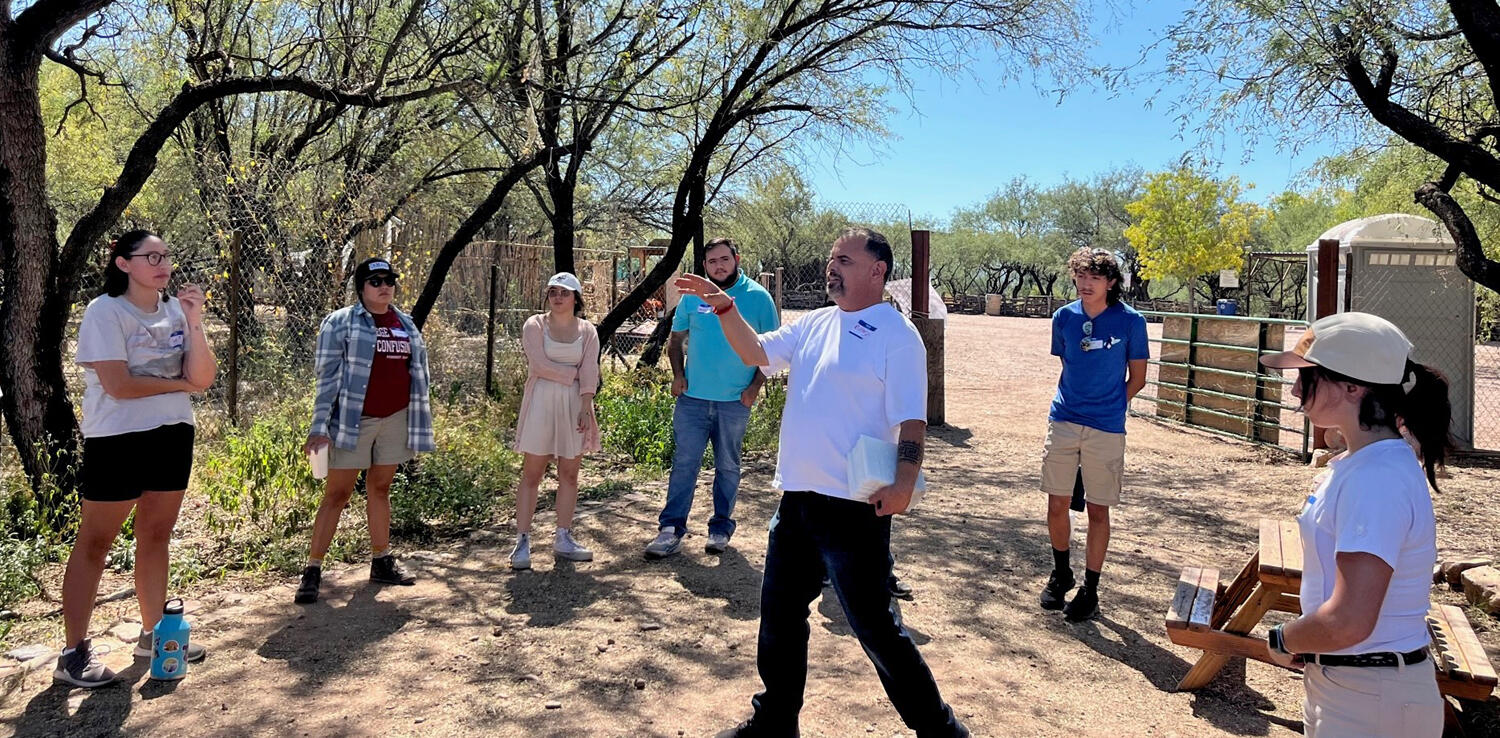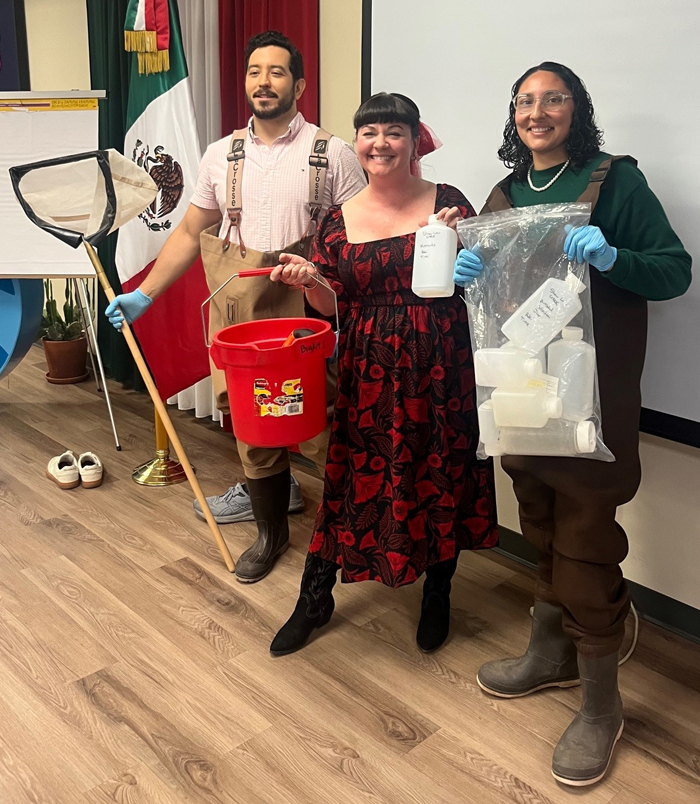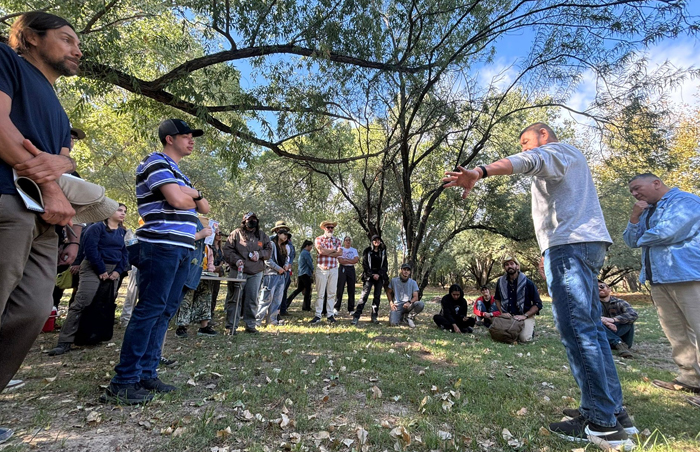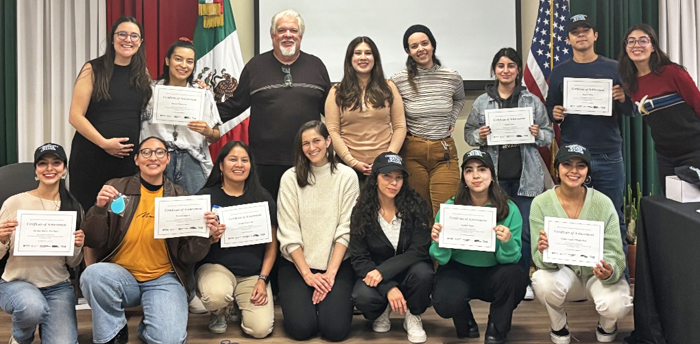
Empowering water leadership in southern Arizona
Arizona Water for All, in partnership with the Rural Community Assistance Corporation and Environmental Defense Fund, piloted a Water Leadership Institute (WLI) in both South Tucson and Nogales to increase empowerment and engagement in water-decision making among Arizona’s most water-insecure communities.
From September to December of 2024, 50 people from across Southern Arizona gathered together for four sessions designed to equip each participant with the skills, knowledge and network needed to meaningfully engage in water issues in their community.
Water issues in Arizona are varied and range from groundwater depletion and pollution to droughts and seasonal flooding, so proposed management strategies must be equally flexible and community-informed. The WLI created a space for seasoned local leaders, like Cesar Lopez, Dr. Selso Villegas and Meghan Smart, to share their first-hand insight into building water solutions in their communities.
Cesar Lopez is the director of SEEDS Farm, an organization in Nogales that is using culturally-based, traditional practices to expand local organic food production and cultivate leadership skills in young people. He worked closely with Arizona Water for All – a pillar of the Arizona Water Innovation Initiative – to build the WLI curriculum and hosted the inaugural session of the institute on the farm itself.
During his tour of the farm, he detailed the farm’s soil restoration practices and displayed the water harvesting techniques including rain catchment implemented on-site—an example of practical, sustainable solutions in a region where every drop counts. Lopez is one of many local leaders the WLI convened to share regional knowledge and experience, showing students that there is no one “right” way to be a leader, and myriad perspectives and skills make up the leadership table.

Meghan Smart, senior scientist with the Arizona Department of Environmental Quality (ADEQ), joined the WLI as another guest speaker to share the power of citizen science with participants as a way to enact meaningful change in water and the environment. Smart is a biologist by training, and developed Arizona Water Watch, an ADEQ community science program that allows anyone across the state with access to a smartphone to upload data relating to water quality in real time.
Arizona’s vast terrain and expansive waterways make it especially challenging for state officials to monitor changes in environmental conditions, so ADEQ has been leveraging the power of community science to understand local conditions and send out resources like clean-up supplies when appropriate.
Smart emphasized the importance of each individual contribution because without the thousands of volunteers who have contributed to Arizona Water Watch to date, ADEQ would not have as comprehensive an understanding of the health and safety of Arizona’s waterways.

Another guest facilitator, Dr. Selso Villegas, Executive Director of the Water Resources Department of the Tohono O’odham Nation, joined the WLI to share an Indigenous perspective on water leadership. His decade-spanning career as a hydrologist and advocate for Indigenous self-determination in water makes him a wealth of knowledge to up-and-coming water leaders.
During an incredibly special tour of the San Xavier District’s Wa:k Hikdan project, an area of the Santa Cruz River that has been restored with riparian vegetation and flowing water, Dr. Villegas led participants through a timeline of the setbacks and successes that made the restoration project possible. This offered participants a firsthand account of the potential for creating restored riparian habitats as emerging water leaders.
Vanessa Fajardo, an undergraduate student at ASU majoring in landscape architecture and co-author of this post, spent her fall semester as a research intern with Arizona Water for All. As part of her internship, Fajardo attended the WLI.
“What struck me most was the inclusivity of the sessions,” Fajardo reflected. “Whether it was through the easy switching between Spanish and English, or Spanglish, the enthusiastic participation in icebreakers, or the way attendees eagerly shared their stories, it was clear that this event was designed to empower everyone involved.”


On graduation day, participants gathered to reflect on everything they had learned and witnessed over the course of the past months, and to boldly share their own leadership stories with their cohort. Each student stood and spoke about their journey to leadership, and reflected on how they would participate in water stewardship moving forward.
According to evaluation data collected by surveying participants, 90% of participants reported that they felt motivated to organize and advocate for their communities, and 85% of participants reported being interested in pursuing a career related to water, climate or the environment.
As ASU researchers and engineers pursue advanced water solutions in Arizona, it’s vital to adapt management and mitigation strategies to fit the diverse needs and priorities of communities across the state. By convening and listening to community leaders with regional expertise, and encouraging young people to pursue a seat at the decision-making table, we can start to build an Arizona with a secure water future for us all.
About the authors:
Daniela Sherrill is the community researcher for Arizona Water for All. She received her bachelor’s degree in sustainability with a minor in civic engagement from Northern Arizona University in 2020. Before joining AW4A, she worked in Flagstaff as a program facilitator at an environmental education center and in Tucson as a community organizer for campaigns that raised the minimum wage for workers across the state.
Vanessa Fajardo is pursuing a bachelor’s degree in landscape architecture at Arizona State University. Her background is in working with community organizations to provide educational resources and opportunities to underserved communities, alongside fostering the post-secondary pipeline. As a student, she hopes to build skills and knowledge in communication and design to create a sustainable future that actively uplifts communities.
Related stories:
- Empowering communities with participatory research
- Graduate student researchers addressing decentralized water systems
- Coalition building in Arizona’s water insecure communities
- Leveraging social relationships to drive meaningful change in water-insecure communities
- Arizona Water for All: Building a partner network